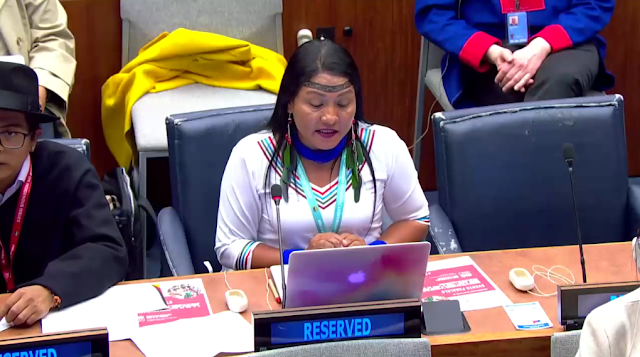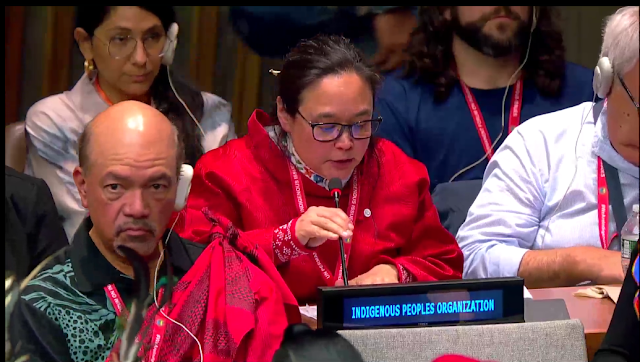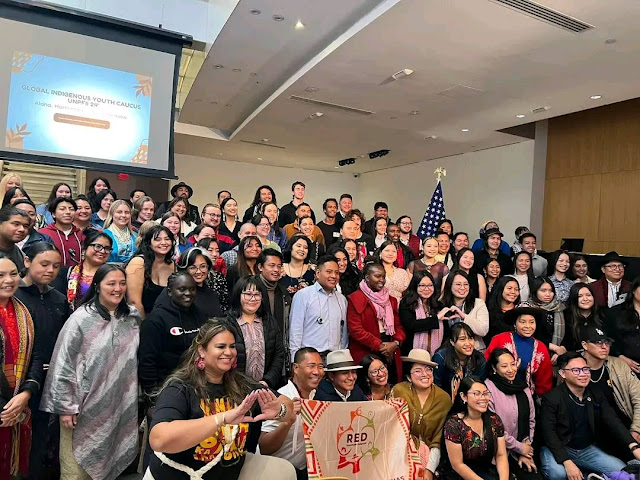Oglala Lakota Youth and the Global Indigenous Youth Caucus Lead at United Nations
By Brenda Norrell, Censored News, April 15, 2024
NEW YORK -- "We are witnessing the genocide and displacement of Palestinian people. We demand the right of return to their ancestral homeland," the Global Indigenous Youth Caucus told the UN Permanent Forum on Indigenous Issues as it opened its session on Monday.
Representing the seven regions of the world, the youths expressed gratitude to their elders for their defense of ancestral homelands, and recognized the role of forced removal of Indigenous children from their families, in disregard for the United Nations Declaration on the Rights of Indigenous Peoples.
Anpo Jensen, Kiyuksa Tiospaye, Oglala Lakota of Pine Ridge, South Dakota, delivered the statement of the Global Indigenous Youth Caucus to the U.N.
Mining interests and government policies threaten Indigenous with displacement, loss of life, the denial of burial and ceremonial rights and the disruption of generational knowledge transfer. The youths pointed out the lack of education that is based on an Indigenous perspective that results in ignorance, and said Treaties need to be recognized as vital in climate change adaptation plans and the legal framework.
Pointing out the global crisis of the genocide in Palestine, the youths called for an expert working group that connects the forced removal and ethnic cleansing of Indigenous youths and people from their ancestral homelands to the worsening climate crisis. They demanded the right of return for Palestinians and funding of UNWRA, the United Nations Relief and Works Agency.
"In real time, we are witnessing the genocide and displacement of the Palestinian people. We demand the right of return to their ancestral homeland, the continued funding of UNRWA, and uplift that the devastating humanitarian consequences of war and settler colonialism for geopolitical interests is an international crisis." (See full statement below.)
Their statement brought a roar of applause at the United Nations in New York.
Anpo Jensen, Kiyuksa Tiospaye, Oglala Lakota of Pine Ridge, South Dakota, delivered the statement of the Global Indigenous Youth Caucus to the U.N.
Mining interests and government policies threaten Indigenous with displacement, loss of life, the denial of burial and ceremonial rights and the disruption of generational knowledge transfer. The youths pointed out the lack of education that is based on an Indigenous perspective that results in ignorance, and said Treaties need to be recognized as vital in climate change adaptation plans and the legal framework.
Pointing out the global crisis of the genocide in Palestine, the youths called for an expert working group that connects the forced removal and ethnic cleansing of Indigenous youths and people from their ancestral homelands to the worsening climate crisis. They demanded the right of return for Palestinians and funding of UNWRA, the United Nations Relief and Works Agency.
"In real time, we are witnessing the genocide and displacement of the Palestinian people. We demand the right of return to their ancestral homeland, the continued funding of UNRWA, and uplift that the devastating humanitarian consequences of war and settler colonialism for geopolitical interests is an international crisis." (See full statement below.)
Their statement brought a roar of applause at the United Nations in New York.
 |
| Vice President of CONAIE Ecuador. Screenshot by Censored News. United Nations WebTV: https://webtv.un.org/en/asset/k1u/k1ugwua9w4 |
In Ecuador, Canada's Mining Means More Violence
CONAIE said mining and energy transition is a crucial issue and affects Indigenous Peoples in Ecuador's right to self-determination. Corporations are using the term 'energy transition' which cannot be used to further the violence which has already resulted from mining.
"Because perhaps the greatest interventions we offer are our lives.
"Finally, the Global Indigenous Youth Council condemns all forms and acts of genocide. We recognize that our freedom is deeply woven and embedded with that of Mother Earth and all our relatives.
"We are not free, until we are all free!”
ICC said in a statement, "The Inuit Circumpolar Council (ICC) is a non-governmental organization that unites 180,000 Inuit Indigenous people across Nunaat, the Inuit homeland that spans Canada, Greenland, Russia, and the State of Alaska in the United States. ICC integrates ancestral Inuit knowledge and practices to protect the Arctic ecosystem and defend land and ocean rights."
In recent months in Ecuador, there has been growing violence due to copper mining, in southern Ecuador, where Canadian companies are copper mining. Copper is considered a 'critical mineral.' Energy transition can not be used to justify pillaging and violence, CONAIE told the U.N.
Currently, talks are underway for a free trade agreement between Ecuador and Canada, but this cannot be done at the expense of Indigenous Peoples, CONAIE said.
Indigenous are being criminalized with the punishment that prevents them from speaking on self-determination.
Makanalani Gomes, Hawaiian Filipino, one of three co-chairs of the Global Indigenous Youth Caucus, expressed deep gratitude for the sacrifices and labor of ancestors and elders, including their work resulting in the U.N. Declaration on the Rights of Indigenous Peoples, and this Forum.
“If I can implore you to take away one thing in particular. I ask you to listen deeply to these interventions that demand a world where we, Indigenous youth, no longer have to be defenders, activists, and advocates instead, we can simply be our fullest Indigenous self.
"Canadian mining companies must be held responsible for their actions," said CONAIE, the Confederation of Indigenous Nationalities of Ecuador.
 |
| Makanalani Gomes speaking Monday at UN Forum. Screenshot by Censored News. |
Indigenous Youths: Self-Determination not a reality without changes: Youths on the Frontline
Self-determination, however, is far from being a reality for Indigenous youths, who face some of the most challenging issues across the planet.
The reality is that for decision-makers in institutions, Indigenous youths' engagement most often is "fleeting and not substantial."
Without true recognition, including structural modification, at the United Nations, she said self-determination for Indigenous youths will continue to be merely an "online document or check in the laundry list of a project involving Indigenous Peoples."
"We do this work in hopes that future generations no longer have to use their bodies, minds, and spirits to defend Earth Mother but rather enjoy their respective cultural ways and partake in the commune that takes place between a mother and her children.
"As our time as co-chairs ends, I will take with me the most potent medicine: Indigenous joy, especially the joy of Indigenous youth.
"As our time as co-chairs ends, I will take with me the most potent medicine: Indigenous joy, especially the joy of Indigenous youth.
"Because perhaps the greatest interventions we offer are our lives.
"Finally, the Global Indigenous Youth Council condemns all forms and acts of genocide. We recognize that our freedom is deeply woven and embedded with that of Mother Earth and all our relatives.
"We are not free, until we are all free!”
Reflecting on serving on the caucus, she said, "It has truly been the honor of my life."
Her address received a roar of applause.
Inuit Caretakers of Far North
The Inuit Circumpolar Council told the U.N. today that Inuit are the original inhabitants in a vast region that is rich in biodiversity. Inuit are working to ensure Inuit rights of living on the land with the resources. Inuit spoke on the importance of receiving the U.N. Equator Prize.
Currently, ICC is establishing an Inuit-managed protected area in the Pikialasorsuaq, a shared region between Canada and Greenland. The ICC initiated the Pikialasorsuaq Commission.
"Through community consultation with youth, elders, men, and women, this groundbreaking initiative aims to preserve the ecological integrity of Pikialasorsuaq, the largest Arctic polynya.
"It also seeks to enable unrestricted movement between historically connected communities. This marks the first international Inuit-led body managing an Inuit Protected Area, setting a unique precedent for conservation and Indigenous rights."

Naw Ei Ei Min, member of Myanmar (Burma) Indigenous Karen people. Screenshot by Censored News
The Criminalization of Indigenous Peoples and Rights
Indigenous Peoples are victims of mining and pipelines, and energy projects around the world, including 'clean energy' projects that do not take into consideration the human rights of Indigenous Peoples, Naw Ei Ei Min, member of Myanmar's Indigenous Karen people, told the UN Permanent Forum on Indigenous Issues as it opened its session on Monday.
Indigenous Peoples are imprisoned for maintaining their rights to their land, in opposition to mining or pipelines. Indigenous leaders are targeted to suppress the entire community. The report points out that Indigenous languages are threatened. Further, the report states that banks and private sectors should not be allowed to support this criminalization.
The report points out the use of the law to criminalize the defense of rights. It also points out the inadequate recognition of indigenous rights in national laws.

Selected as the Chair of the UN Permanent Forum on Indigenous Issues this year is Ms. Hindou Oumarou Ibrahim, an Indigenous Mbororo woman from Chad. She is an expert in Indigenous Peoples’ traditional ecological knowledge and climate change adaptation and mitigation strategies.

Naw Ei Ei Min, member of Myanmar (Burma) Indigenous Karen people. Screenshot by Censored News
The Criminalization of Indigenous Peoples and Rights
Indigenous Peoples are victims of mining and pipelines, and energy projects around the world, including 'clean energy' projects that do not take into consideration the human rights of Indigenous Peoples, Naw Ei Ei Min, member of Myanmar's Indigenous Karen people, told the UN Permanent Forum on Indigenous Issues as it opened its session on Monday.
Indigenous Peoples are imprisoned for maintaining their rights to their land, in opposition to mining or pipelines. Indigenous leaders are targeted to suppress the entire community. The report points out that Indigenous languages are threatened. Further, the report states that banks and private sectors should not be allowed to support this criminalization.
The report points out the use of the law to criminalize the defense of rights. It also points out the inadequate recognition of indigenous rights in national laws.
https://social.desa.un.org/sites/default/files/n2403079%20EN.pdf Sonia Guajajara, Minister of Indigenous Peoples of Brazil. Screenshot by Censored News "We will never again have a Brazil without us," said Sonia Guajajara, Minister of Indigenous Peoples of Brazil, during her passionate appeal in the defense of Indigenous in the Amazon, during the opening of the UN Permanent Forum on Indigenous Issues on Monday. "This is not a legacy that is given," she said. "We must be courageous and walk together." The journey begins here, she said, "So the world will never again walk without the participation and knowledge of Indigenous People." Guajajara said the Free Land Camp, the largest gathering of Brazil in last 20 years, begins next week, which means many Indigenous in Brazil are preparing now for this gathering. Progress is being made, but a systematic approach is needed to protect against environmental racism. "We cannot leave anyone behind." Referring to a just transition, she said half of the energy transition minerals are in Indigenous Peoples' territory. "We cannot allow this to result in more violations." "The extreme right and climate deniers will gain strength if social inequalities widen with climate changes." Without protection, organized crime and destructive capitalist policies will remain strong. She said the environmental agenda must be combined with the human rights agenda. There must be free, prior and informed consent. Respect must be given for the rights of youths, women and those with disabilities, she said, urging working with other groups focused on the protection of Mother Earth. The United Nations said on Monday, "Lack of investments in Indigenous women and girls remain particularly acute. The Forum also pressed for special attention on promoting Indigenous women-led initiatives to strengthen their economic rights, further empowering Indigenous women and girls and dispelling harmful stereotypes that reinforce discrimination." "The contributions of Indigenous women are invaluable to our societies. We must take action now to ensure they have equal access to finance and support, empowering them to lead and succeed,” urged H.E. Sonia Guajajara, Minister of Indigenous Peoples of Brazil. Hannah McGlade speaking at opening session on Monday. Screenshot by Censored News Australia's Incarceration of Aboriginal Youths: Cruel and Inhumane "Unliveable, disgusting and inhumane," those are the conditions that children endure in Australia's prisons. The policy of taking Aboriginal children from their families continues with the cruel and inhumane treatment of Aboriginal children in prisons, Hannah McGlade told the U.N. "Their lives are precious, their lives matter," McGlade said. The removal of Aboriginal children from their families, high rates of child incarceration, and extensive hours in solidarity confinement, are among the reasons that Australia has one of the highest suicide rates in the world. McGlade praised Australia's youths for their efforts for constitutional reform. However, it was denied, and the voice of Australia's Aboriginals denied. |

Chair of UNPFII Hindou Oumarou Ibrahim, Chad. Screenshot by Censored News.
David Choquehuanca, Vice President of the Plurinational State of Bolivia, highlighted the role of Indigenous Peoples in putting the planet first, the United Nations said.
"We must transition from an anthropocentric to a biocentric approach to ensure our youth hands over a healthier Mother Earth to the generations to come. This necessitates redirecting financial resources directly into the hands of Indigenous Peoples, the stewards of our planet’s biodiversity."
Over 2,000 participants convened at the Forum joined by representatives from the United Nations.
This year, the Forum spotlights Indigenous Peoples’ rights to self-determination and voices of Indigenous youth. Read the U.N. statement at: https://www.un.org/en/desa-en/opening-remarks-23rd-session-un-permanent-forum-indigenous-issues
NEW! Day 2: Warriors for New Generation: Indigenous Youths Lead UN Permanent Forum
Appointment of our sister Hindou Oumarou Ibrahim, from the Mbororo pastoral community in Chad, as the chair of the 23rd session of the UN Permanent Forum on Indigenous Issues. Photo Indigenous Peoples Rights International.
Censored News new series on the United Nations Permanent Forum on Indigenous Issues
Bolivia: The Women in My Community Have Always Been Warriors
Spotlight on Indigenous Youths: Katisha Paul
Omaha Nathan Phillips: Prayer, Lithium and an Ancient Language Lost
Blood Memories: Indigenous Women on the Frontlines Inspire with Words and Action
Warriors for a New Generation: Indigenous Youths
Indigenous Youths Lead at UN Permanent Forum on Indigenous Issues
About the author
Brenda Norrell has been a news reporter in Indian country for 42 years, beginning at the Navajo Times during the 18 years that she lived on the Navajo Nation. She served as a correspondent for The Associated Press and USA Today. After serving as a longtime staff reporter for Indian Country Today, she was censored and terminated. She created Censored News in 2006. Today with 23 million page views, it has no ads or revenues.
Article copyright Brenda Norrell, Censored News









No comments:
Post a Comment